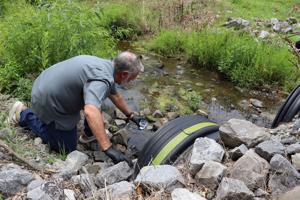
The pervasive presence of per- and polyfluoroalkyl substances, commonly known as PFAS or “forever chemicals,” has prompted urgent calls for a global ban. These chemicals, which number over 10,000, are widely used in products ranging from nonstick cookware and waterproof clothing to firefighting foam and dental floss. Their resistance to degradation means PFAS accumulate in the environment and human bodies, leading to serious health concerns.
The issue of PFAS contamination has reached critical levels in various regions. For instance, the National Institute for Public Health and the Environment in the Netherlands has warned residents against consuming eggs from backyard chickens due to elevated PFAS levels. Investigations suggest that earthworms, which are consumed by these hens, may be contaminated, although further research is needed to confirm this theory.
In England, a report from environmental organizations, including Wildlife and Countryside Link and the Rivers Trust, revealed that nearly all rivers, lakes, and ponds exceed proposed safety limits for PFAS, with 85% showing levels at least five times higher than the acceptable threshold. The situation has become so dire that France has banned tap water in 16 communes due to similar contamination issues.
The health implications associated with PFAS exposure are alarming. Studies link these chemicals to increased risks of various cancers, fertility issues, and compromised immune systems. The situation mirrors the challenges posed by climate change, with evidence suggesting that major manufacturers, including 3M Co. and DuPont de Nemours Inc., have known about the toxic effects of PFAS for decades while failing to disclose this information.
Despite ongoing litigation that has cost these companies billions in settlements, 3M announced plans in December 2022 to phase out the use of PFAS by the end of 2025. The financial burden of PFAS pollution is staggering, with estimates suggesting that cleaning up contaminated sites in the UK and Europe could cost €100 billion (approximately $116 billion) annually if preventative measures are not taken. Furthermore, the Nordic Council of Ministers estimates that healthcare costs related to PFAS could amount to at least €52 billion each year.
Some companies are taking steps to reduce PFAS in their products. For instance, Patagonia Inc. and McDonald’s Corp. have committed to eliminating these substances from their offerings. However, significant resistance remains, with lobbying efforts aimed at weakening proposed restrictions in Europe.
Current regulations are inadequate, often addressing only specific chemicals or products. In Denmark, a ban on PFAS-treated clothing and footwear will take effect in July 2026, while France has prohibited these substances in several consumer product categories. Notably, cookware has been exempted from the French ban, raising concerns about the influence of industry lobbying.
In 2023, a coalition of five European Union member states—Germany, the Netherlands, Sweden, Denmark, and Norway—submitted a proposal for a comprehensive ban on PFAS to the European Chemicals Agency. This proposed regulation aims to address all PFAS collectively rather than on a case-by-case basis, a necessary shift given the sheer volume of chemicals involved.
If implemented smoothly, this ban could come into effect by 2028. However, the UK government’s recent interim position on PFAS management has been criticized for its lack of urgency and comprehensive scope. In the United States, the situation is equally concerning, with previous administrations cutting research funding and recent announcements from the Environmental Protection Agency to roll back drinking water limits for PFAS.
While a complete ban on PFAS may not eliminate the substances already present in the environment and human bodies, evidence suggests that regulations can lead to positive change. For example, the ban on PFOS and PFOA in Europe has resulted in significant declines in blood concentrations of these chemicals in Denmark.
The urgency of addressing the PFAS crisis is clear. With mounting evidence of the chemicals’ harmful effects on health and the environment, the call for a universal ban is growing louder. Action must be taken to prevent further contamination and mitigate the damage already inflicted. The time to act is now, before the situation becomes irreparable.






